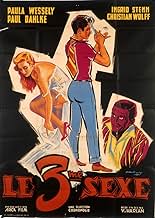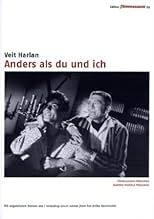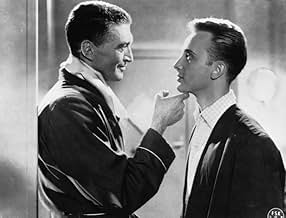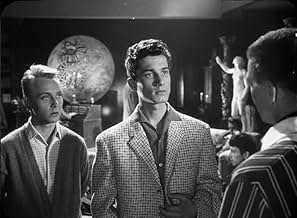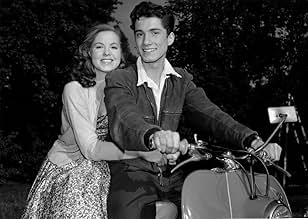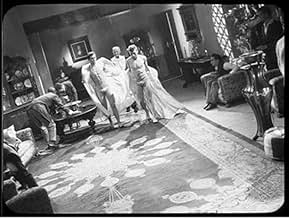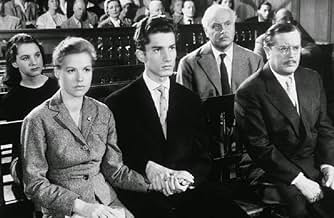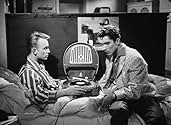Adicionar um enredo no seu idiomaKlaus is a young man in post-war Berlin. He is drawn to his friend Manfred and, under the encouragement of their acquaintance, Dr. Winkler, explore the underground world of gay clubs and ele... Ler tudoKlaus is a young man in post-war Berlin. He is drawn to his friend Manfred and, under the encouragement of their acquaintance, Dr. Winkler, explore the underground world of gay clubs and electronic music. His family begins to learn of his other life and do everything they can to ... Ler tudoKlaus is a young man in post-war Berlin. He is drawn to his friend Manfred and, under the encouragement of their acquaintance, Dr. Winkler, explore the underground world of gay clubs and electronic music. His family begins to learn of his other life and do everything they can to set him straight.
- Manfred Glatz
- (as Günther Theil)
- Travestiekünstler
- (as Marcel Andrée)
- Butler Maurice
- (não creditado)
- Petra Mertens
- (não creditado)
- Direção
- Roteiristas
- Elenco e equipe completos
- Produção, bilheteria e muito mais no IMDbPro
Avaliações em destaque
Harlan soon staged his much-awaited comeback and started making movies in which the word Jew was taboo. Alas, all he was interested in making, were movies inciting hatred. So if you are no longer allowed to openly incite hatred of the Jews --- though soon even that may be allowed again in a unified Germany where the death of thirty thousand Aryans during the bombing of Dresden is nowadays widely viewed as comparable, if not worse, than the wanton genocidal murder of six million Jews--- there is always some other group to pick on.
Not aware that homosexuality was on its way to becoming legal in the land of Roehm, Harlan had decided he would make a gay-hating movie for a change. The story is so inane, that I will forgo any spoilers. What no one can miss though, is the fact that the way the "good Germans" in this movie talk to and about gay men, is a mutatis mutandis quotation of the way they used to talk in Harlan's wartime movies to and about the Jews shortly before murdering them. This does not stop at spoken language but extends to body language as well.
Though the word Jew is never uttered in "Anders als Du und Ich," the movie's openly gay bad guy goes by the certainly non-Aryan name of Dr. Boris Winkler, and his man-servant is known only by his, in Germany most Semitic of surnames, Maurice. I guess the Goebbels boys must have been at it yet again, even though like his child-murdering spouse, the cowardly propaganda minister had swallowed his cyanide more than a decade before the shooting of "Anders als Du und Ich.."
Maybe the most disgusting feature of this movie is the participation of the legendary stage actress Paula Wessely, who had acted in Nazi propaganda movies during the war and then asked to be forgiven for this "lapse". There is no denying that Wesssely was one of the most spellbinding stage actresses of all time. But to participate in a movie in which she is asked to act the role of a mother, who after having heard rumors that her son may be gay, learns all she ever wanted to know about homosexuality, by furtively looking up the one-paragraph entry "Third Sex" in a Hitler-era lexicon, indicates that a very limited intelligence informed Wessely's great acting talent.
Former UFA director Harlan was cleared of war crimes in 1948, claiming he was only following orders and that Goebbels tampered with his JUD SUSS but judging by what the censors did to DIFFERENT FROM YOU AND ME (an implicitly prejudiced title changed from the original THE THIRD SEX) there might be some truth to that.
The reviewer is also wrong in supposing that post-war Germany was well on the way to reforming the law. It actually took a very hard line not greatly different from that of the Nazis. Homosexuals incarcerated by Hitler were not released in 1945 but obliged to continue their terms of imprisonment under article 175. The official view as represented by the film-censorship body the FSK was that homosexuality should be portrayed as a menace to society. The situation in Germany was very different from that in Britain where the Wolfenden Report in this same year advocated a reform of the law for which there was now a favourable consensus although the actual reform would have to wait for the election of a Labour government. Basil Dearden's 1961 film The Victim restates the case for reform but it was already in fact expressing a view endorsed by the Wolfenden Commission.
In Germany it was now much more difficult to make a film sympathetic in its treatment of homosexuality, more difficult than it had been in the much more tolerant atmosphere of 1919 or 1924. Although the Harlan film is based on a screenplay by Felix Lützkendorf entitled Eltern klagen an (Parents Accuse) designed to highlight the dangers of homosexuality,he also employed homosexual activist Hans Giese as scientific consultant for the film and very clearly intended it to be broadly sympathetic towards homosexuals and to shift German opinion towards reform of its archaic laws. It is, even in the original, a somewhat timid and clumsy effort but Harlan's intentions are not really in doubt.
The film does not portray homosexuality as "evil". The homosexual characters are not simply demonised, and the depiction of the gay world is not altogether unsympathetic. As other reviews have pointed out, the original film refers to the more tolerant attitudes in other European countries and is implicitly critical of German intolerance in this respect. The audience's sympathies throughout are with the tolerant uncle and mother, not with the hectoring, blackmailing father whose intolerance is clearly shown to be part of the problem.
Of course homosexuality is not "cured" by a heterosexual relationship but this is not really the intended message. Harlan is on record as believing that there were both those who were naturally homosexual (the Hirschfeld thesis) and those who were attracted towards homosexuality for other reasons (the case of Klaus in the film). Harlan typically hedges his bets, warning against homosexuality in the second case (n conformity with the official view) but nevertheless making a case for more tolerant attitudes with regard to the first category.
The FSK certainly had no doubt whatsoever about its sympathies and not only was the title changed for release in Germany (but not in Austria) but Harlan was obliged by the censors to make many small changes that greatly mitigated the message of the film (you can find a catalogue of these changes in the relevant article on Wikipedia).
The US was at this time quite as bigoted in its attitude as Germany but censorship was more relaxed with regard to foreign films and Harlan was able to release a version there under the original title (The Third Sex) which still omits material from the original (including, comically enough, cuts to the heterosexual scenes) but is closer to the original than the heavily censored version that appeared in Germany itself. This dubbed version is also available on Youtube.
It is ironic that, having been condemned for his wartime complaisance towards official German policy, to which he may have had no strong objections, Harlan should have been condemned again in 1957 for the changes that official censorship had imposed, this time very clearly at variance with his own intentions.
Jud Süss is not really the "genocide-inciting" film that. It is racist but its racial thesis is almost identical to that of The Birth of a Nation and its treatment of Jews and Jewish culture distinctly less caricatural and dehumanising than Griffith's treatment of blacks). It is entirely possible to sympathise with Süss in the film (in a way in which it is not really possible to sympathise with "blackface" Gus in The Birth of a Nation) and to feel that he is treated hypocritically when he is condemned - an interesting element in common with this film - by an archaic law. The mean-minded German bourgeoisie who take their revenge on him for his support of a petty tyrant (historically accurate enough) are portrayed in a not dissimilar to the intolerant father in this film). Jud Süss is in many respects a good film (it won the Coupe Mussolini at the Venice Film Festival and was praised by young Italian critic Michelangelo Antonioni) and would doubtless have been less racist had Harlan not had Goebbels breathing down his neck just as this film would have been different had Harlan not been up against German censors.
The trouble is that Harlan made little effort to resist Goebbels and was just as pathetically compliant with the censors in 1957, re-dubbing significant sections of the film and even re-shooting scenes at their behest.
Perhaps Harlan's real crime was simply a consistent lack of moral courage.....
.
Você sabia?
- CuriosidadesWas censored, cut and initially banned upon it's release for tackling, what was considered to be a controversial subject of (then criminalized) homosexuality.
- Versões alternativasGerman edit is heavily censored; US cut, although shortened, more like the original, director's cut.
Principais escolhas
Detalhes
- Tempo de duração1 hora 31 minutos
- Cor
- Proporção
- 1.37 : 1
Contribua para esta página


